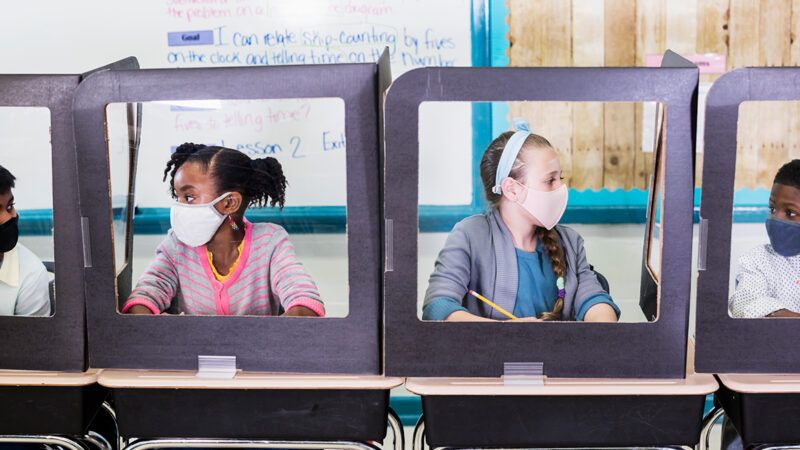The Pandemic Will Make Kids or Break Them
During a pandemic, as always, life is about balancing risks, not eliminating them.

The COVID-19 era has worked as a stress test for parents and kids alike, breaking some while bringing out reserves of strength and resilience in others. But it's not the disease itself that's done so much damage; it's the isolation, fear, and stressed adults that have driven many kids during the last year to anxiety, obsessive behavior, and even suicide.
"The strain of the COVID-19 pandemic on children underscores the need for pediatricians to address emotional and behavioral health as part of standard care," the American Academy of Pediatrics (AAP) announced on March 15. "Suicidal ideation and attempts have increased among youth during the pandemic."
Around the same time, the Associated Press warned that "pediatric psychiatrists say they're also seeing children with coronavirus-related phobias, tics and eating disorders, obsessing about infection, scrubbing their hands raw, covering their bodies with disinfectant gel, and terrified of getting sick from food." Much of the problem, experts say, lies in the imposed social isolation of lockdown mandates, school closures, and cessation of most normal social contact amid overheated warnings about infection.
"Children and adolescents serve as 'emotional barometers' for their family and often reflect the level of stress of parents and caregivers," the AAP notes. But not all parents have succumbed to the bunker mentality. As the world retreated around them, people often socialized—sometimes quietly when the law or neighbors disapproved—with like-minded acquaintances.
With many public schools closed, some families also created learning pods—rebranded as homeschooling co-ops—in which kids could learn together and mingle. Others chose private schools that offered in-person learning and contact with classmates. While there is some risk of contagion when kids mix, that has to be balanced against the danger to "emotional and behavioral health" from isolation and marinating in fear.
We've seen this personally among my son's classmates at his private school, which allows families to choose remote or in-person learning. While my son physically attends classes, two of his buddies stepped away from their computer screens only once, to visit our house for an assigned film project. "Blink three times if you need me to rescue you from your basement," my son joked to one over Zoom after the brief meeting.
Those families, having seriously altered their lives in response to pandemic fears, probably entrusted their kids to us because my wife is a pediatrician who presumably understands health perils and precautions. And that's true, but not necessarily in the way those who have self-isolated might assume. While she has seen families fall ill and lose people (usually older or with preexisting conditions) to COVID-19, she also has seen children fall prey to lockdown-triggered depression, anxiety, and suicidal thoughts. During a pandemic, as always, life is about balancing risks, not eliminating them.
That's why the AAP has consistently called for in-person learning. "Children absolutely need to return to in-school learning for their healthy development and well-being," AAP President Lee Savio Beers said in January while introducing his organization's latest school guidance. "Policy makers and school administrators should acknowledge that COVID-19 policies are intended to mitigate, not eliminate, risk," the guidance emphasizes.
It's not just education. "Children and adolescents can be encouraged to spend time outdoors participating in physical activities, even with peers, as long as risk mitigation strategies are followed," the AAP says in its separate mental health guidance. "For all ages and stages, facilitating resilience is key."
That observation echoes a November 2020 paper in European Child & Adolescent Psychiatry pointing out that "nurturing resilience during a disease pandemic is important as it helps to reduce worries, anxiety and depression." The authors recommend "promoting resilience through shared family beliefs and close relationships among parents and siblings."
Friends are important too. My son has met not just with those two reclusive classmates but also with other trusted friends for role-playing games and general hanging out. In contrast to some of their peers, these kids are remarkably free of anxiety, tics, or serious emotional problems. They don't like the pandemic era, but it's something that drives them to endure rather than hide.


Show Comments (49)